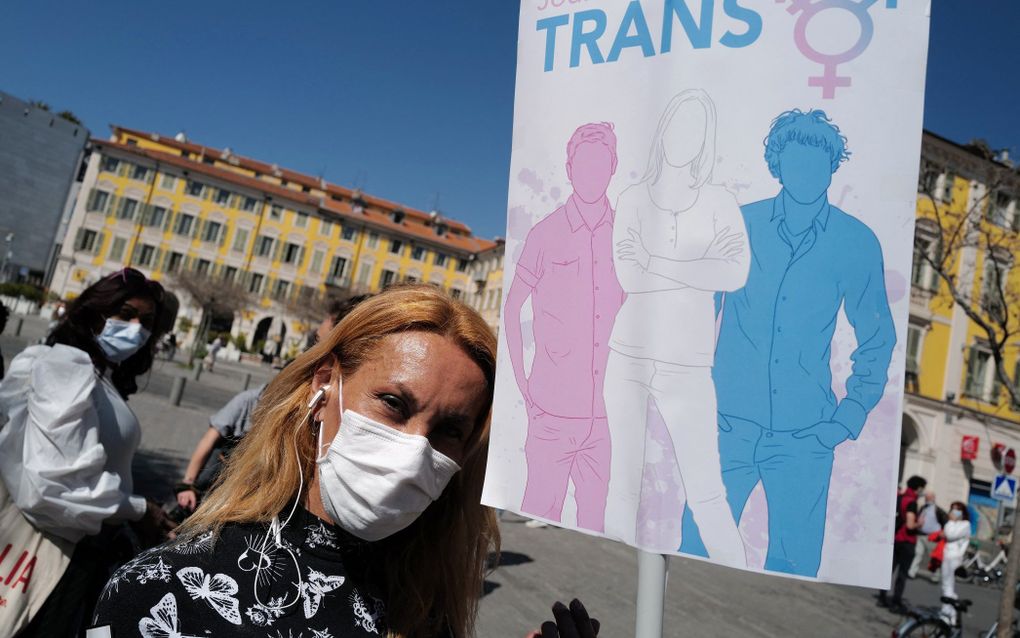Stop the denial of biological reality: Your Sex Matters
30-05-2022
Opinion
Elise van Hoek

Photo AFP, Valery Hache
Opinion
In The Netherlands, gender-critical voices are still weak, writes sociologist Elise van Hoek in an opinion article. When will the realisation dawn on the public that the lobby of the transgender rights activists is heading towards an open denial of one’s biological sex, impractical policies, and damage to our children?
The new transgender law, which will be debated by the Lower House of the Dutch National Parliament this spring, should make it easier to legally change gender. Already since 2014, someone can legally change one’s gender without undergoing a body-altering operation, but what is new about this transgender law is that a doctor or psychologist no longer needs to diagnose gender dysphoria (gender dysphoria is when one has a persistent discomfort about their own sex). This can be done through self-identification.
And here we come to the heart of the problem. This law creates a new reality that can have major consequences. There will no longer be a definition of what a man or a woman is. Subjective gender identity will take precedence over biological sex. Physicality, femininity, and masculinity are positive organizing principles that matter. If we exchange this visible biological reality for postmodern relativism, we lose a shared vision of reality.
A broad cultural movement
A footnote should be made here. In this opinion article, I focus on an advancing culture clash that calls for a counterargument and that is partly being waged on the backs of vulnerable transgender people. This is undesirable. It is precisely in the interest of people who suffer from gender dysphoria that we must expose the ideology. This is not about whether gender dysphoria is a condition that does or does not belong in the DSM-V (a Dutch Manual for Psychiatry). This is not a medical-scientific discussion, but primarily a cultural, social and ultimately a political controversy.
Worldwide, Sexual Orientation and Gender Identity (SOGI) laws are being introduced. By law, it is stipulated that a medical diagnosis of gender dysphoria is no longer required, no hormonal therapy or surgical intervention, and no change in appearance to change gender. Instead, the reality of being male or female exists only in the mind of the person who claims to be male or female. So, you can call yourself a woman, but have a penis. Or say you are a man, but give birth to your own child.
Self-identification
Self-identification is already a practice in a number of countries. A biological man can call himself a woman and gain access to women's toilets, changing rooms or prisons. Not only does this make women feel uncomfortable or unsafe, it has already led to actual incidents of physical violence and rape. Within women's sports, the influence of trans women has a great impact. For example, Lia Thomas, the Ivy League trans swimmer towers over her teammates as a winner. If self-identification is regulated by law, objecting to it becomes a form of discrimination.
In terms of policy and language, The Netherlands already fully participates in creating a gender-neutral reality. “We promote diversity because it is essential to realizing our strategy", states the Dutch ING Bank. The municipality of Amsterdam drew up gender-neutral language tips for its civil servants. The fact that citizens react critically to this en masse shows that the demand is not coming from within the society. Rather, these influences come from international trends and is being implemented away from the public eye.
The denial of women
In early April 2022, Liberal Australian Senator Alex Antic raised the question in the Australian Canberra Senate whether the Ministry of Health could define what a woman is. The Minister, Professor Brendan Murphy, could only concede that there are "definitions of how people define themselves”. Before that, British Labour Party leader Keir Starmer criticized MP Rosa Duffield who supported the statement that 'only women have a cervix'. Naming the uniqueness of men and women, such as gender expression or the fact that gender also permeates socially and culturally, is coming under increasing fire. And those who let go or cross the boundaries are given a stage in the media as brave inspirational role models. But medical science is also taking a position. The Lancet was buried under angry reactions from women when it spoke of "bodies with vaginas" while in the same issue men were mentioned by name. But it's not just about men and women. Binary distinctions are necessary to distinguish between these phenomena, to make judgments about something. It allows us to distinguish between right and wrong. The political goal of this movement is to eliminate the meaning of biological gender as an important organizing principle in our society. This leads irrevocably to disorder and chaos. Gender matters in rules, laws, policies, language and culture.
Social pressure and sanctions
Resistance is countered by informal and formal sanctions. J.K. Rowling, the author of Harry Potter, has received death threats because of her criticism of "people who menstruate". The views of Professor Kathleen Stock on biological sex generated so much controversy that she was forced to leave her University. Employees who refuse to use the "new" form of addressing their non-binary colleagues can expect to be fined. In The Netherlands, the Human Rights Board ruled in favour of trans woman Aleksandra with penis. The gym was said to discriminate because it denied Aleksandra access to the women's locker room.
But the consequences could be even more far-reaching. In Canada, a father named Robert Hoogland ended up in jail for not consenting to his 14-year-old daughter’s medical transition. And in the State of California, a father named Ted found himself in court and stripped of parental rights for not supporting his son Drew's sudden desire to undergo a sexual transition. Changing attitudes will not only affect legislation and policy, but also the lives of young teens.
Rising desires among teens to undergo a transition
It would be naive to hope that these developments overseas will blow over in The Netherlands. Although access to transgender care in the United States is more accessible than in The Netherlands, the trend towards affirmative care has begun here as well. Partly due to teaching methods provided by Rutgers, a Dutch expert centre on sexuality and COC Nederland, a Dutch LGBTQ+ rights group, children have become familiar with the idea that gender identity is a choice and that you have the right to change your gender. The intention is that the age limit will disappear in the new transgender law, so that young people under the age of sixteen can change their gender registration. While previously it was mainly young boys who struggled with gender dysphoria, now more and more adolescent girls are reported to visit gender clinics.
This trend is becoming more broadly visible in Western countries. Experts also point out that the demand is changing. Previously, there were children with a clearly noticeable history of struggles with their sex, which is no longer always the case. There are strong indications that confusion around sex and gender in teenagers and young adults can arise from "social contagion" and that social media plays a major role in this, as described by journalist Abigail Shrier and researcher Lisa Littman along with being recognized by several leading gender doctors.
First the debate
What is at stake is the freedom to ask questions and express one's opinion about this development. Someone who raises questions is immediately accused of questioning people's trans identity and thereby failing to acknowledge their deepest selves. By raising a question, one would hurt them, harm them or increase trauma. At the same time, it makes any conversation impossible. And that is serious. This not only touches the lives of young people searching for their identity, but this touches the freedom in our society to express our thoughts. It touches our journalistic freedom and open debate.
This is where our democracy does not function as it should. This is an issue for a society-wide debate and whereby political parties should show their true colors well in advance. Otherwise a new transgender law can be introduced that many people have never heard of, let alone considered the consequences. We must take the signals of increasing chaos over male-female definitions, the pressure and coercion against those who resist, and the skyrocketing desire for transition among young people extremely serious. A change in the law is the last thing that fits into this right now.
Elise van Hoek is manager at NPV Zorg.
Related Articles






